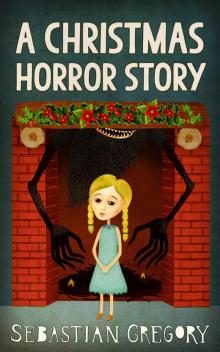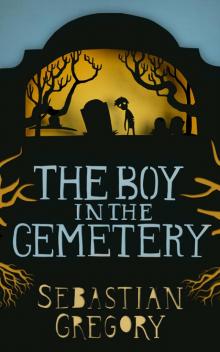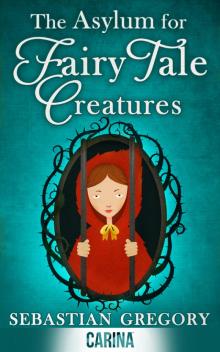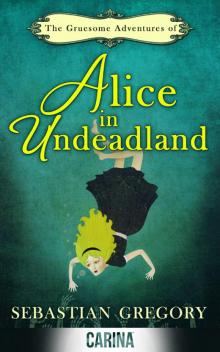- Home
- Sebastian Gregory
A Christmas Horror Story Page 2
A Christmas Horror Story Read online
Page 2
‘Done,’ Katie said when she finished, rubbing her arms.
‘Good,’ Jake remarked seriously. ‘So if zombies ever attack we’ll be safe.’
‘Indeed, although not from Emily.’
He smiled. It was good to see him smile.
‘OK, has there been a full moon tonight?’
‘Not that I know of. It’s pretty cloudy out there—the weather man said we’re in for snow.’
‘Are you sure?’
‘Positive.’
‘Have you invited any strangers into the house recently?’
‘Recently no and also never.’
Jake thought for a moment. ‘OK, I’m ready for bed.’
They walked hand in hand down the hallway with its cold wood floor and up the creaking cold wood stairs. Katie flicked an old light switch and two dull bare bulbs lit the hallway, stairs and landing in a buzzing neon. Katie had to duck under another beam as she reached the top. In the bathroom another bulb flicked into life. The bathroom smelt damp and mould had conquered the sickly yellow-green paint. They cleaned their teeth, smiling behind the mint foam. Then Katie tucked her brother into bed. He lay there in the glow of his night light, his ever-present book by his side. Katie always thought there was a sadness to her brother, despite his smiles. It was there behind his blue eyes. Nothing seemed to faze Emily. She was the toughest person Katie knew, but Jake…Jake was always hiding sadness.
‘Can you check my bed?’ he asked.
Katie smiled and nodded. She crawled on the floor, which was a minefield of action figures and dirty clothes.
‘Nothing under the bed a hoover wouldn’t cure,’ she remarked before standing up and checking the wardrobe. ‘Nor here’,’ she added.
‘OK then, goodnight,’ he said, turning onto his side and closing his eyes.
‘Goodnight,’ Katie replied, but he was already asleep.
And while he was asleep he dreamt. But more than a dream…it was a warning.
Chapter Two
London, Christmas Eve 1940, during the Blitz
The London sky was a deep black canvas covered by a million, billion pinpricks of light. Floating amongst the stars like gigantic whales in the sky, air balloons tethered by ropes bobbed in the night-time breeze. The balloons and sky were occasionally lit with huge beams of light, arcing and criss-crossing in circles like streaking moons.
In contrast, London itself was in shadow. Not one sliver of light escaped its dark grasp. Curtains drawn and street lamps murdered, the city huddled together, terrified that in the dark, this very Christmas Eve, enemy bombers would sooner or later come to destroy them. But there were two children who were not scared at all.
They sat in the rubble of a house that had been bombed two weeks previously. Nothing was left of the house except for the ghost of four walls and a ceiling and the mountain of bricks, wood and broken glass. The girl and the boy had made small stools of some of the bricks and sat upon them. They wore duffel coats tied with toggles in an attempt to keep warm, but they both still shivered as they wore their short school uniforms underneath. It was not the most efficient attire for keeping back the chilly night cold and they quivered almost in tandem. The boy held a gas mask in his hand, which he moved this way and that, occasionally tapping the glass eyepieces. The girl kept her mask firmly in its box, placed by her feet. She adjusted the slide on her bobbed brown hair, as if making herself presentable. Both of the children had their red leather satchels strapped over their shoulders. The boy was no older than eight, about three years younger than his taller sister, who sat next to him.
‘Mary?’ he asked in a questioning tone.
‘Yes?’ she replied, distracted by the sky above.
‘What if the soldiers think Santa is a German and they shoot him down?’
‘When?’
‘When he comes flying with his sleigh and reindeer. What if they think he’s got bombs and they blow him up?’
‘That won’t happen, Wiglet,’ Mary reassured him. ‘Santa is magic. Bullets and bombs can’t hurt him; they just bounce off.’
‘Like Jesus?’
She put her arm around her brother. ‘Yes, just like Jesus.’
Mary’s brother had been known as Wiglet ever since he began to walk with a sort of funny little toddle andhips and arms swinging. Dad had said he looked like a Wiglet, and Mum and Mary laughed and the name had stuck. That was a long time ago and Dad was gone now, fighting Hitler, and Mum didn’t laugh so much anymore. She stayed in her room mostly, crying to herself in the dark. When she ventured out, she was weak and unsure. She was sickly thin and pale, and now only wore her nightgown. Her eyes had a vague, distant look that rarely registered when her children spoke to her. Their father, on the other hand, well the children could hardly remember what he looked like. They remembered his uniform, green and neat. They remembered his hair, black, shiny and slick. But the details: his voice, his smell, the look of his face. Those had faded.
Mary and Wiglet had sat on the stairs two days before; it was early morning when the old lady with the curled blue hair and a stern look came to their home. Two days before Christmas, and no decorations adorned the house. The walls lay bare save for drab wallpaper and cobwebs. Christmas dinner would consist of scrounged food served on dirty plates, left to ferment afterwards in the kitchen sink. Mary held her brother and they listened to the muffled voices through the closed living room door.
‘We will have the children until the war is over or when you begin to feel better. This is no place for them. No place for children.’ It was the voice of the stern lady. Her voice was shrill and sharp and the door did nothing to muffle it.
‘I don’t want to leave,’ whispered Wiglet. ‘I want to stay and look after Mum.’
‘I know,’ ‘Mary replied. ‘Don’t worry. I have an idea’.’
‘Really?’
‘Yes, we need to find Santa Claus. We will ask him for help.’ They used to have Christmas parties. They used to celebrate the season, but that was before the war, before Dad went and Mother’s smiles went with him.
Her brother smiled for them both and shook with excitement.
‘I’m cold. When can we go home?’ Wiglet asked, bringing Mary back from her wandering thoughts.
Mary sighed. ‘You know when. As soon as we find Santa and ask him to stop the war. So Dad can come home and we won’t be sent away.’
‘Will he be long?’ he wanted to know.
‘Just be patient. Watch the sky; he will be here.’
And they did, their eyes fixed on the sky with the giant balloons and the stars looking back to the dark city below.
‘Look’. Wiglet stood and pointed. The bricks shifted uneasily under his feet. His gas mask drooped in his free hand.
Mary looked. In the cold, cold distance there were lights that were not stars. They moved in a triangle formation of tiny flashing orange and green lights.
‘Is that Santa?’ the boy asked.
Mary could not answer. She trembled at the sight, knowing what would come next. A few bricks in the centre of the wrecked house vibrated and tumbled into the darkness with a stone jangle.
First the children heard the wail of the sirens, screaming their banshee screams, a warning to the city that disaster was approaching. The sounds of engines thrumming filled the air, twisting with a whistling sound dropping from above. Barely seen in the darkness but getting closer, bomber planes cut the distance in no time at all. And when they did, the world was suddenly alive with more light and noise than any Christmas celebration could ever hope for. The horizon burst into a catastrophe of fire and orange, and waves of hot breeze blew over the brother and sister. Suddenly the night became day as bright lines of machine gun fire sped towards their targets, hundreds of planes overhead like a demon invasion.
Mary gripped her brother’s hand and pulled him as they both went tumbling down through the carcass of the house and debris. Mary was sure they were both screaming but the sound evaporated in the hot air. The
street was alive with families, terrified, running to shelters while a fire truck thundered through the streets. Mary and her brother, beyond fear that Christmas Eve, fell to the ground. There, they could only huddle against the wall as a whistling bomb destroyed the street.
When Mary opened her eyes, there was an uncomfortable, oppressive silence. Her ears rang in time with the throbbing from her temple. She coughed up a dustball. Her mouth was dry. It was snowing and from her prone position on the concrete, she could see the world had turned a grey, dirty white. She forced her aching body to sit up. The world was a mist, a huge ghost swirling with the odour of fire. The snowflakes fell in hot ashen chunks and a faint yellow glow filled the unseen skyline.
For a moment she was lost in the slow motion of it all and the confusion from her painful thoughts.
‘Wiglet?’ She gasped. ‘Wiglet?’
A cold feeling of panic froze her, as her brother’s absence replaced her pain with terror. She pulled herself upright against the wall behind her before standing, somewhat unsure of her legs. A step at a time she wandered. Shadows moved in the smoke and the silence was broken by a scream that quickly died as fast as it appeared.
‘Paul, Paul,’ s’he croaked as loud as she could, her face a guise of ash and tears.
‘Mary,’ came the soft reply; it floated in the air gently and clutched a hint of excitement.
Despite the pain, despite the confusion, it was all worth the relief of hearing her brother’s voice. Although through the swirling snow she could not fathom the direction and peered for clues. There were only the dark shapes of crumbled burnings and the orange glowing mist.
‘Where are you? I can’t see you,’ ‘she moaned.
‘I’m here,’ he replied with even more excitement in his voice, like a child with a secret to share. He called to her, ‘This way, this way. I’ve found Santa. He’s here, he’s here.’‘
Mary limped in a circle to find her brother. Her eyes were becoming red blotches in the snow and dizziness kept her off balance. Her tracks were quickly covered by the falling ash, along with any tracks her brother may have left. She had become as pale as the sinister, falling snow.
‘This way, this way,’ the voice called. ‘This way!’ And finally, the mist parted and formed a walkway through the white, revealing a fiery orange-coloured sky.
As she walked through the mist, she heard the sound. A jingle of bells, Christmas chimes calling and reaching out with hope. Bleary-eyed, she could see dark figures within the veil of snow. An adult and a child holding hands, except somehow, the proportions seemed wrong, and the adult figure was elongated, not unlike a late-afternoon shadow.
‘Wiglet?’ she murmured, and her relief at finding her brother was replaced with a creeping anxiety. It lurched from her stomach, like a nightmare from the shadows or crawling from under her bed.
Her eyes widened at her brother, who was only a few feet away. Covered in the grey powder of the snow, Wiglet smiled, holding the hand of the thing beside him.
‘I’ve found Santa. Look.’ He beamed the smile of a child finding he had Christmas day to himself. But to Mary, the thing holding her brother’s hand in its own black scaly claw was the utter antithesis of everything that was joyful and full of cheer. Try as she might, no sound left Mary’s mouth as she attempted to scream. A hand snaked through the fog, unfurling shining black claws and holding out its hand for Mary to take. In that black palm lay the gift of a piece of coal, wrapped in a red ribbon.
Chapter Three
Moorside, Glossop, England, 23 December 2014
Katie crept into her room so as not to wake her sister. As the house had three bedrooms, Katie and Emily had to share. They had a bunk bed, and Emily preferred to be in the bed below while Katie slept above. The room was not large enough for two teenage girls, being just a tight space of wardrobe and chest of drawers and bed. Their clothes lived mostly in piles and since Mum was so busy at the hospital, the arrangement worked quite well, as she was simply too busy to tell them to tidy up. Katie changed into her nightgown in the dark, letting her clothes join the others on the floor. It was getting cold, and she shivered as she climbed the ladder to her bed. Snuggled under her quilt and fighting back the winter air, which seemed to seep straight through the walls, she thought of what she would do when she had to go to university.
Her GCSE results had been exceptional, and her college had told her that the world was her oyster. But could she really leave Mum, Emily and Jake? They needed her, that was obvious, but at times Katie felt like home was choking her. The responsibility of being the eldest in a single-parent family was sometimes a heavy burden to carry. But if she thought on it now, she would never sleep, so she relaxed and cleared her mind and tried not to worry. It was easier said than done. Still, Mum would be home soon and she would sleep easier then.
Katie had barely closed her eyes when she realised that she was no longer in the comfort of her bed. Now, she stood shivering to death in the middle of a white field surrounded by the falling snow. It covered the horizon and the nearby landmarks with a static white film, making it impossible for Katie to get her bearings. The wind and winter soaked her flimsy nightclothes and turned her skin purple, wet and bloodied through frostbite. Her fingertips and her toes were numb with cold and were turning hardened black. She would have screamed but the wind and weather choked her as soon as she opened her mouth.
With little choice before hypothermia claimed her, she tucked in her arms as best she could and began to trek. Each step was akin to walking on broken glass, sharp and painful to the bone. Into the frozen waste Katie went, when suddenly through the storm she spied a figure, a large blurred man shape, as faint as a pencil drawing being erased. He was calling, waving, wavering. The shouts were lost to the air and the waves were a blur but Katie still had little choice but to try to reach the figure. With each step her heavy frozen legs did not bring her any closer to the stranger. For with each step the figure seemed further away, until the shape became one with the snowflakes.
But suddenly and without warning, Katie was no longer lost to the storm, for the wind had turned to a whisper. Her surrounds had changed. There were still the great hills and mounds of snow, but now there were buildings, old buildings in crumbled stone. Then was a tower of steel, a hundred feet tall if it was an inch. A skeleton of rusting white and reddish cold metal. Around the structures stretched a chain-link fence. Katie now knew she was dreaming, for this was Moorside coal mine. This was where her father died. She saw him now, dressed in his black police uniform and long black winter coat. He walked amongst the dead buildings, calling out to the missing hikers lost in the snow.
She called his name. ‘Stephen, Stephen, Dad, Dad.’ But he didn’t so much as look her way. She screamed for him until her voice was hoarse and dry, then changed tactics and ran to her father across the snow, but slowly as her legs were stone and the snow glue. And as he turned to her, she saw his blue eyes looking back, and he waved at her as the ground collapsed around him, and with a gust of dust and filth he was swallowed into the sinking black void of the mine.
But Katie was not the only dreamer. Emily also murmured in her sleep.
Chapter Four
Our Sweet Lady Orphanage, England, Christmas Eve 1833
Henrietta was fast asleep in a comforting blanket of darkness when someone shook her awake. Tiny hands pushed her in a rocking motion, causing her to groan and retreat further into her thin blanket.
‘Go away, Alice. Go back to sleep’,’ Henrietta protested. She knew it would be Alice of course. There had been many times when the five-year-old girl had woken Henrietta from one imagined night terror or another.
‘No wake up, Henri. You have to see this’.’ Alice shook Henrietta as hard as she could, and although this was hardly anything at all, it was enough to make Henrietta throw back the blanket and give Alice the meanest of looks.
‘Yes?’ she said through gritted teeth. Alice pulled a sulking face, her bottom lip drooping as much a
s her dark eyes, and with her blonde hair in pigtails, Alice looked cuter than ever. Henrietta had always considered Alice to be a sister. Henrietta was ten years old, hair as black as raven feathers, skin as pale as snow. She had always felt obliged to look after the younger ones coming to the orphanage. Their sad and fretful faces pulled on something deep within her. So when Alice walked through those large, foreboding doors into the hallway, flanked by the nuns and wearing rags, Henrietta’s heart melted.
It was dark in the dormitory and the gas lamps on the ornate wooden walls only cast the dimmest of shadows. Henrietta’s eyes adjusted to the gloom. She peered at row upon row of tiny beds disappearing into the shadows; each one had dishevelled blankets and empty pillows.
‘Where is everyone?’ Henrietta asked.
‘I told you, you have to come and see. Father Christmas is here!’ Alice explained, grinning a missing-teeth smile.
‘Is this some kind of joke? Because if Sister Madeline finds everyone hiding then it will be the whip for sure’.’ All of the two hundred or so girls in Our Sweet Lady Orphanage had at one time or another felt the whip, a metre-long piece of cane used to punish any unladylike or ungodly behaviour. Offences were anything from not curtsying when a nun walked by, to forgetting to wash behind the ears.
‘It’s not a joke. I swear on my mother’s soul, whoever she was’,’ Alice promised, holding her hand in the air. ‘Father Christmas came and promised us all we’d have parents, for Christmas.’
Of course Henrietta didn’t believe in Father Christmas or miracles of any kind. According to the teachings of the nuns, Christmas was for remembering God’s sacrifice and not for praying to mythical beings for selfish reasons such as presents and gifts. Being abandoned by parents and being dragged up in an orphanage as unwanted children, the girls were taught that they were orphaned because of sins of past lives. That they had been cruel and thankless, so now they were unloved and only by hard work and punishment could their souls be cleansed. This had given Henrietta a less than magical view of life.

 A Christmas Horror Story
A Christmas Horror Story The Boy in the Cemetery
The Boy in the Cemetery The Asylum for Fairy-Tale Creatures
The Asylum for Fairy-Tale Creatures The Gruesome Adventures of Alice in Undeadland
The Gruesome Adventures of Alice in Undeadland